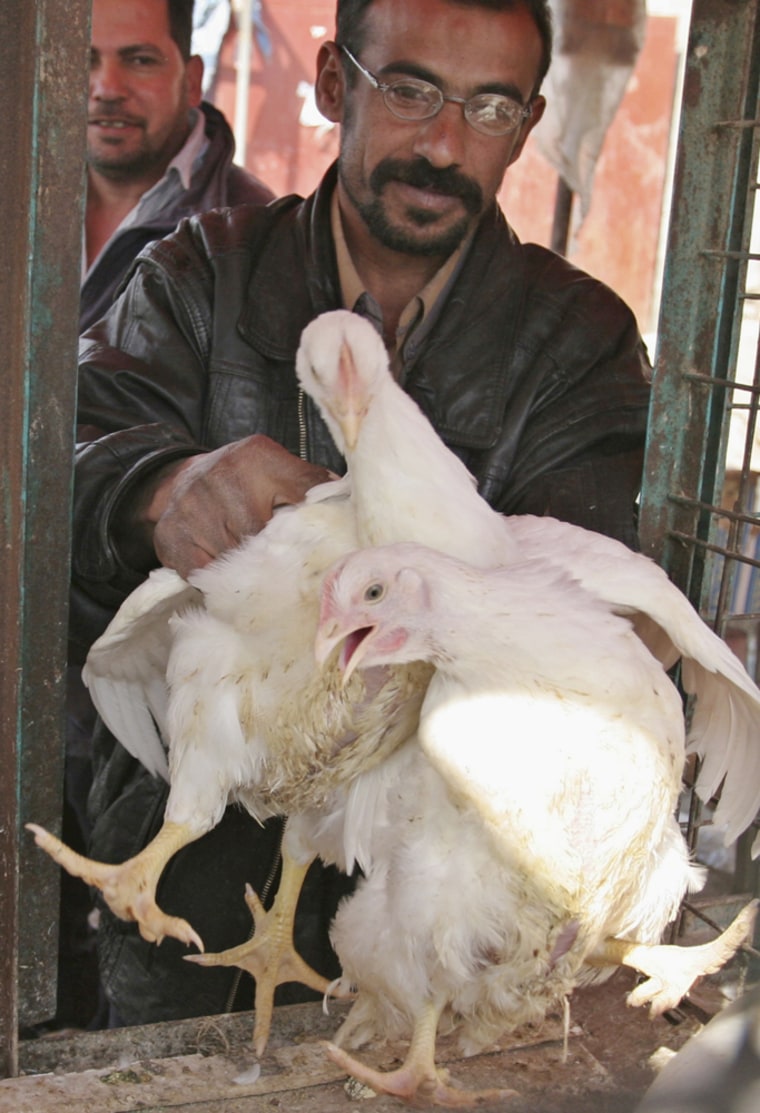Amina Qader gazed sadly as her 70 ducks and chickens, once her main source of income, were hauled away Tuesday in plastic bags to be buried alive in a nearby muddy grave.
The widow’s birds are among more than 500,000 killed in the past two days across northern Iraq as this war-ravaged country battles to control a deadly bird flu outbreak. The bird slaughter followed Monday’s announcement that a 15-year-old girl who died Jan. 17 had the deadly H5N1 strain.
“I am so scared of bird flu, so I gave all my birds away to be killed, even though none were ill,” she says. “We’ve relied on them for years for our livelihood. What are we to do now?”
Iraqi authorities have promised to compensate people for the loss of their chickens, ducks and other domesticated birds, but have given no amount.
Bingird is a village of about 2,500 people on the eastern side of Dukan reservoir, a stop for migratory birds flying south from Turkey, where at least 21 people have been diagnosed with the H5N1 strain.
It is also across the murky reservoir from Raniya, the Iraqi town where Shangen Abdul Qader lived with her uncle, who died of similar symptoms on Jan. 27. All Bingird’s 25,000 domestic birds have been destroyed.
Health experts are investigating if the virus found in both victims had mutated into a more virulent bird flu strain, which could be easily passed between humans and trigger a pandemic capable of killing millions.
Mohammed Khoshnow, health minister of the Kurdish self-ruled region, said 14 other people have been hospitalized with respiratory problems, but only two are being considered as possible bird flu cases. The other 12 have been cleared of having the deadly disease.
Threat from migratory birds
While health authorities have not yet confirmed how Abdul Qader contracted the virus, Iraqi officials believe that infected migratory birds introduced the disease to domestic birds kept by her family.
Migratory birds from Turkey pass by Raniya toward the Tigris and Euphrates rivers, which they follow to Iraq’s southern marshlands, before moving on to Kuwait and then South Africa.
Health authorities across Iraq are on high alert in a bid to stop any spread of the disease. Mobile hospitals have been sent to the country’s northern Kurdistan region to treat people suspected of contracting it.
The World Health Organization expects to have a team of epidemiologists and clinicians on the ground by the end of the week to test people and birds to try learn how the disease entered Iraq and how widespread it might be.
The European Commission is also sending a specialist from the Sweden-based European Center for Disease Prevention and Control to assist the WHO.
A WHO laboratory in London will test samples from the dead girl to officially confirm the preliminary H5N1 results obtained at a U.S. Navy laboratory in Cairo on Sunday. Further samples are being sent to the Cairo lab from the girl’s uncle.
A total of 85 people had died of the disease worldwide before the Iraq case was reported, according to WHO figures.
Mass bird slaughters
Iraqi health authorities are trying to limit the disease’s spread through mass bird slaughters and quarantining suspect villages. Five mobile hospitals were to arrive in Kurdistan late Tuesday to treat people suffering from bird flu-like symptoms. Awareness campaigns are also under way.
“This disease is a fast-spreading one, so we have to work very quickly because our time is very limited,” Iraqi Health Minister Abel Mutilate Mohammed told reporters.
U.S. Embassy health attache Jon Bowers said Iraqi authorities had the necessary infrastructure to detect new cases and prevent any spread, but there were concerns over their ability to safely and effectively destroy birds.
Some of the team members carrying out the slaughter complain they aren’t equipped to carry out their grisly task.
“I am so scared of being infected by this deadly disease because we are in direct contact with infected birds,” team member Mustafa Paper, 65, said in Bingird. “I didn’t take any vaccine because it is in short supply. I just follow orders because I am a minor employee.”
A top Sulaimaniyah University veterinarian also said Iraqi authorities had limited vaccines to treat people, while smugglers from nearby Turkey, Iran and Syria crossed easily across Iraq’s porous borders, bringing with them potentially infected chickens.
“The borders are so wide and so open that we cannot control them,” Dr. Babas Ail Abbacy said. “There is smuggling of chickens taking place and it is as hard to stop as preventing terrorists entering.”
